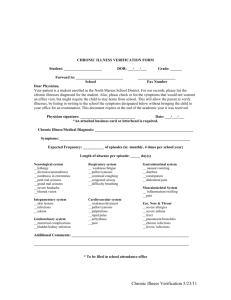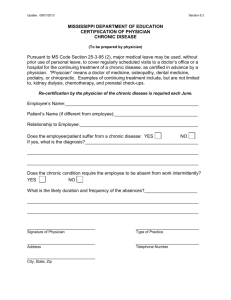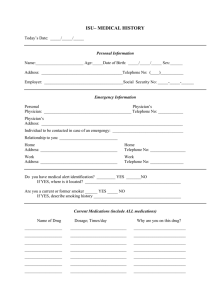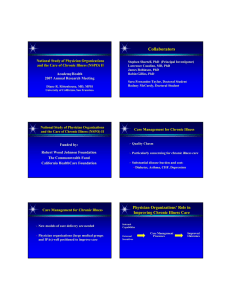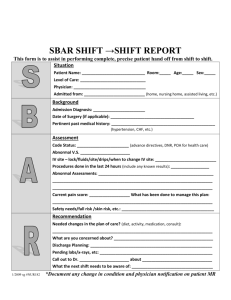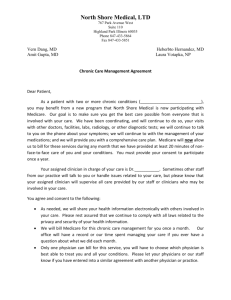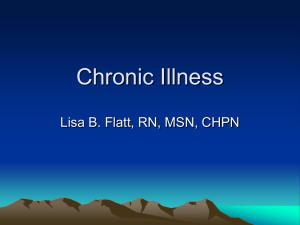National Study of Physician Organizations AcademyHealth 2007 Annual Research Meeting
advertisement
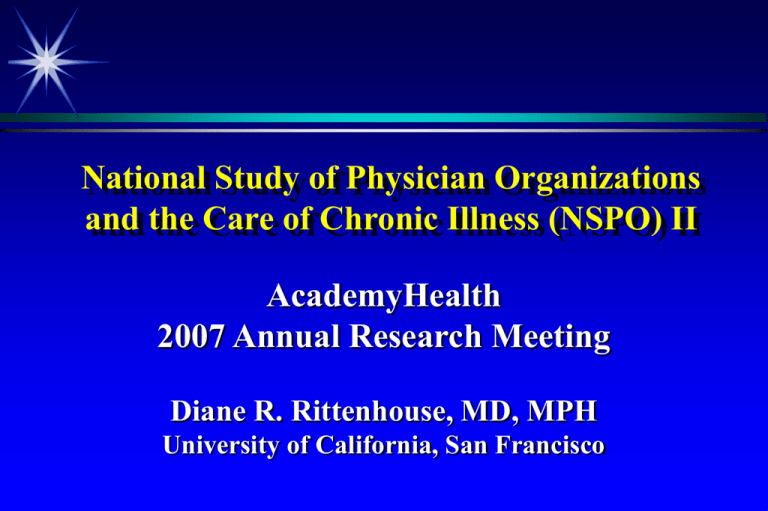
National Study of Physician Organizations and the Care of Chronic Illness (NSPO) II AcademyHealth 2007 Annual Research Meeting Diane R. Rittenhouse, MD, MPH University of California, San Francisco Collaborators Stephen Shortell, PhD (Principal Investigator) Lawrence Casalino, MD, PhD James Robinson, PhD Robin Gillies, PhD Sara Fernandes-Taylor, Doctoral Student Rodney McCurdy, Doctoral Student National Study of Physician Organizations and the Care of Chronic Illness (NSPO) II Funded by: Robert Wood Johnson Foundation The Commonwealth Fund California HealthCare Foundation Care Management for Chronic Illness Quality Chasm Particularly concerning for chronic illness care Substantial disease burden and cost: Diabetes, Asthma, CHF, Depression Care Management for Chronic Illness New models of care delivery are needed Physician organizations (large medical groups and IPAs) well positioned to improve care Physician Organizations’ Role in Improving Chronic Illness Care Internal Capabilities External Incentives Care Management Processes Improved Outcomes National Study of Physician Organizations and the Care of Chronic Illness (NSPO) II Comprehensive list of all U.S. physician groups (medical groups and IPAs) with 20 or more physicians n=1063 35 minute phone survey with Medical Director or CEO 1/1/06 - 3/31/07 52% response rate; n=551 physician groups Physician Organizations – Improving Chronic Illness Care Internal Capabilities External Incentives Care Management Processes Improved Outcomes Care Management for Asthma and Diabetes Electronic registry Guideline based reminders at point of care Performance feedback to physicians Send reminders to patients Specially trained patient educators Provide nurse case managers Mean number of CMPs (out of 6) Diabetes Asthma 51.0 % 50.8 % 65.6 % 51.6 % 73.6 % 54.6 % 38.1 % 36.0 % 56.5 % 35.6 % 53.1 % 42.6 % 3.66 2.86 Care Management for CHF and Depression Electronic registry Guideline based reminders at point of care Performance feedback to physicians Send reminders to patients Specially trained patient educators Provide nurse case managers Mean number of CMPs (out of 6) CHF Depression 38.4 % 32.8 % 51.1 % 35.4 % 53.4 % 47.6 % 23.6 % 22.8 % 33.2 % 20.0 % 35.4 % 25.3 % 2.79 1.78 Care Management for 4 Diseases On average, physician organizations used 11.1 (out of 24) care management processes for all 4 chronic diseases. “Practice Re-design” Advanced Access scheduling: 59.7% Group visits for chronic illness: 24.7% Primary care teams: 30.3% Physician Organizations’ Role in Improving Chronic Illness Care Internal Capabilities External Incentives Care Management Processes Improved Outcomes Patient Centered Culture Does good job of assessing patient needs Staff promptly resolve patient complaints Patient complaints are studied to identify patterns Patient data are used to improve care Patient satisfaction data are used in developing new services Health Plan Activities To what extent do physician organizations report that health plans are providing CMP services to their physicians/patients? Are health plan and P.O. efforts complements or substitutes? Participation in Quality Initiatives Does your group participate in any quality improvement demonstration programs? (Eg: Bridges to Excellence, IHI, Pursuing Perfection, Improving Chronic Illness Care) Does your group use the rapid cycle quality improvement strategy (PDSA)? External Incentives for Quality % yes Evaluated -- on patient satisfaction -- on quality -- on IT use Receive extra income -- for pt satisfaction -- for quality -- for IT use Receive better contracts for quality/pt sat Receive extra income for efficiency 80.6 82.8 53.4 46.5 55.4 32.8 28.7 33.9 Emerging Story Internal Capabilities Culture plays an important role Health plan care management activities are complementary to physician organization efforts Participation in quality improvement programs External incentives Prevalent and associated with increased care management
